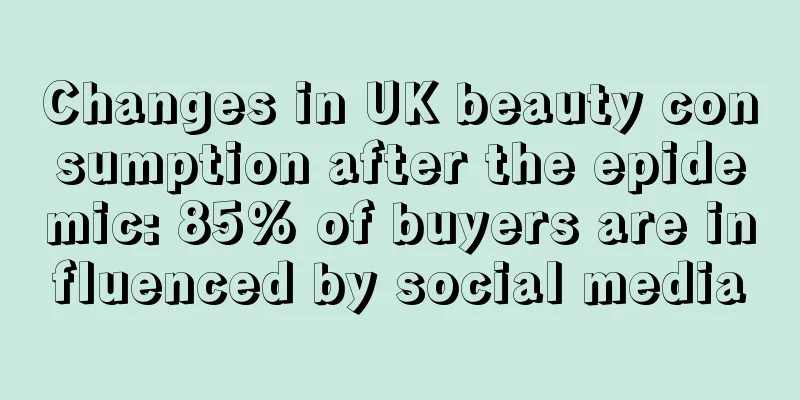Changes in UK beauty consumption after the epidemic: 85% of buyers are influenced by social media

|
After the outbreak of the epidemic, many retailers in the beauty and cosmetics industry have stated that business has been much worse both online and offline.
A big part of the reason is due to the impact of isolation policies. Social opportunities have decreased, and people have spent more time at home. As a result, people don’t need to spend much energy on their appearance , so naturally their demand for cosmetics has also decreased.
As epidemic prevention and control becomes normalized, people begin to resume social activities and the beauty industry begins to recover. In order to better understand the changes and trend forecasts in consumer consumption in the beauty field before and after the epidemic, British consumer agency Harris Interactive UK conducted a survey of 1,000 female consumers.
It is worth noting that the rapid development of social media during the epidemic has also had a greater impact on consumer purchases.
85% of the respondents said they were influenced by social media when purchasing beauty products, of which 58% were influenced by Instagram, 50% were influenced by Tik Tok recommendations, and 49% were influenced by YouTube.
This also shows that social media will have a great impact on consumer purchases in the near future. When sellers and companies choose marketing strategies , social media platforms are an option that cannot be ignored . And outputting different content for different platforms can attract different young consumers.
Instagram is very popular among consumers because the pictures and product demonstrations on it are relatively exquisite and can easily arouse the desire to buy . Relevant sellers can spend more time on this aspect when marketing and promoting their products.
The survey results show that after resuming normal social activities, consumers will pursue more natural beauty methods for their personal appearance. 37% of the respondents said they would choose a more natural makeup look; 31% of consumers would use perfume less frequently; 27% of consumers would stop or reduce the use of heating tools to style their hair; and 24% would choose a more natural hair color.
More respondents said they would focus on body care, such as using body lotion regularly, and were more interested in DIY beauty and self-care.
As for the change in purchasing methods, before the epidemic, 54% of consumers would choose to buy beauty products online, which also shows that since then, consumers' purchasing habits have shifted from offline to online. The epidemic has accelerated this change, and currently 70% of consumers choose to buy related products online.
A quarter of the respondents said they would choose to shop online, and this proportion will increase. Consumers prefer to buy from comprehensive retailer websites, accounting for 39%, while consumers who choose beauty retailer websites and brand independent websites are 18% and 12% respectively.
The reason is that 52% of people think that the prices will be more favorable when buying on comprehensive websites; 46% of people said that they can buy all the products they need at the same time, which is more convenient; 35% of consumers said that such websites will have more discounts for returning customers.
Therefore, as the digital age enters its mature stage, the proportion of e-commerce online shopping will only increase. Business sellers in the beauty industry need to constantly follow up and optimize the e-commerce part to keep up with the trend of the times and attract more consumers.
Through relevant survey reports, we can understand the psychology of consumers and changes in consumption structure, which is helpful for sellers and enterprises to adjust marketing strategies and product selection in time, and plays an important role in establishing store image and increasing product sales. U.K. Beauty |
<<: Customs conducted strict inspections and a large number of goods were detained!
>>: Amazon's third-party sellers are losing pricing control
Recommend
What is dansinhair? dansinhair Review, Features
dansinhair specializes in Brazilian body wave tres...
Online shopping is booming, and many old golf courses and office buildings in North America have been transformed into warehouses
The COVID-19 pandemic has accelerated the develop...
Crazy killing? The trend of association is still continuing, and the seller's appeal fee starts at 25,000!
Accounts were linked, and a wave of account closu...
India's Snapdeal launches new brand campaign, focusing on "high quality and low price" route
Recently, Indian online trading platform Snapdeal...
Without relying on Amazon! Shenzhen sellers became the top sellers in the category in just 3 years
In recent years, the overseas demand for consumer...
What is Oxygen Wallet? Oxygen Wallet Review, Features
Built to support hundreds of millions of users, Ox...
iOS privacy policy changes cost social media companies nearly $10 billion
Social media platforms including Facebook, Snapch...
What is CSM? CSM Review, Features
<span data-docs-delta="[[20,{"gallery"...
What is Westwing? Westwing Review, Features
Westwing was founded in 2011 by Delia Lachance (né...
Amazon joins hands with manufacturers to fight counterfeiting, and many Chinese sellers are sued!
Recently, Amazon and WEBER filed a lawsuit agains...
Sellers enter the 10 billion market! It exploded overseas
In recent years, the global camping economy has b...
What is AMZ-MAX? AMZ-MAX Review, Features
AMZ-MAX has professional experience in Amazon big ...
Will Generation Z become the dominant consumer in the online market? The purchasing power of Generation Z in the United States is amazing
Recently, Pitney Bowes released the latest BOXpol...
The United States plans to impose retaliatory tariffs on six countries, and India's tax may exceed 100 million US dollars
According to the Environmental Times, the United ...
What is Haicheng Supply Chain? Haicheng Supply Chain Review, Features
<span data-docs-delta="[[20,{"gallery"...









